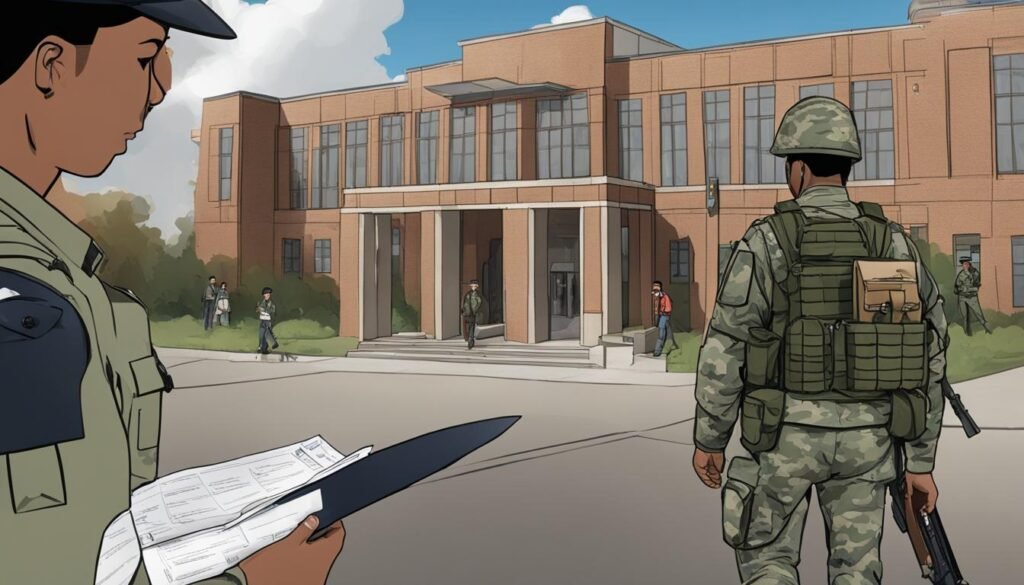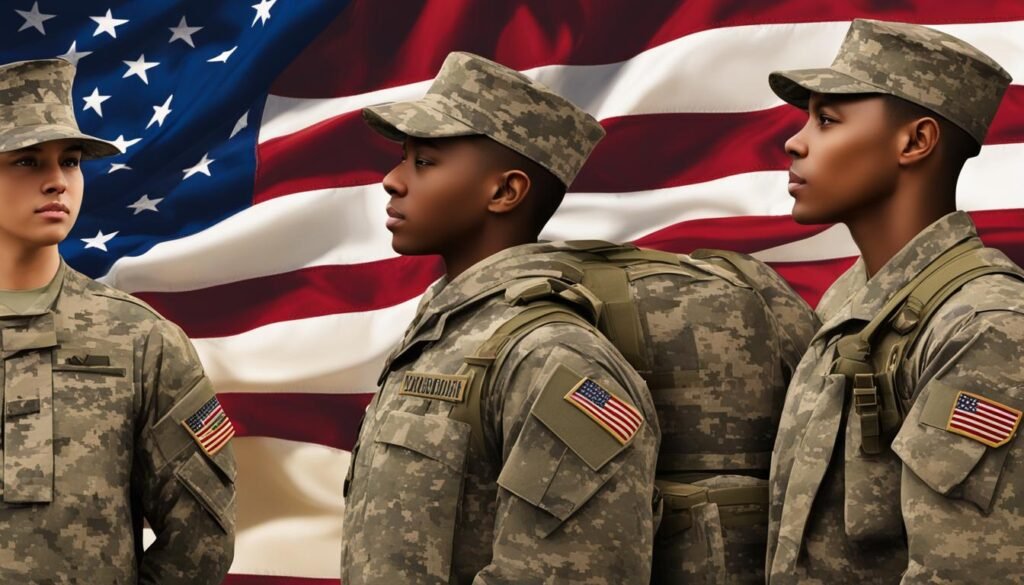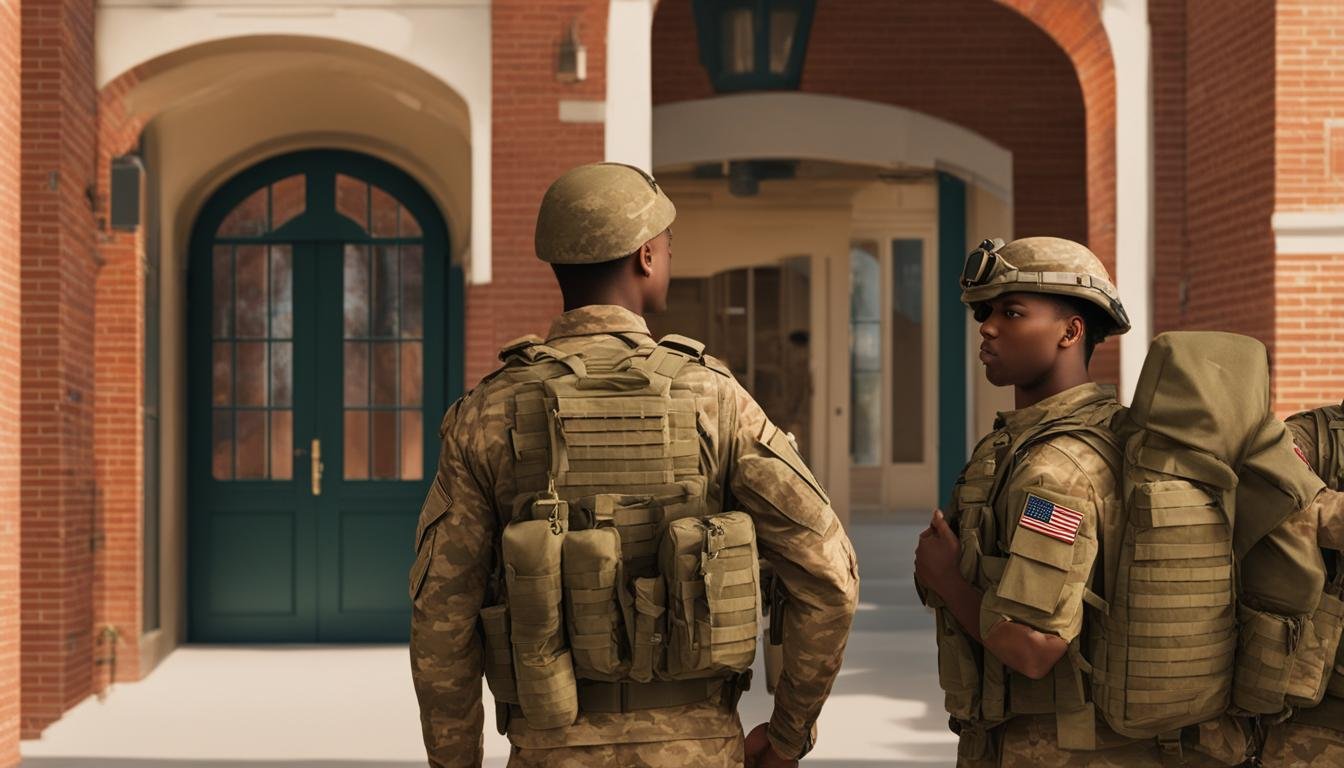Military service members, including active-duty servicemembers, Reservists, National Guardsmen, and Veterans, have acquired valuable knowledge and skills during their service. The Joint Services Transcript (JST) and Community College of the Air Force (CCAF) provide official documentation of military training and experience that can be used to evaluate and potentially award college credit.
Key Takeaways:
- Military service members can earn college credit for their valuable experience and training.
- The Joint Services Transcript (JST) and Community College of the Air Force (CCAF) provide official documentation for credit evaluation.
- Colleges and universities accept the JST for credit evaluation, with over 2,300 institutions recognizing its validity.
- The College Level Examination Program (CLEP) allows military personnel to earn college credits through passing exams.
- Veterans can use their Post-9/11 GI Bill benefits to cover CLEP exams and administration fees.
Requesting Transcripts and Assessing Military Experience

To request a Joint Services Transcript (JST) or Community College of the Air Force (CCAF) transcript, simply visit the respective websites for the Army, Navy, Marines, Coast Guard, Air Force, or Space Force. These transcripts provide official documentation of your military training and can be accepted by more than 2,300 colleges and universities across the country.
Before awarding college credit for military experience and training, colleges and universities typically require official transcripts. The JST includes detailed information on your military course completions, occupations, college-level test scores, and other valuable learning experiences. It’s vital to ensure you have these transcripts ready when applying for credit evaluation.
Additionally, the American Council on Education (ACE) evaluates military courses and occupations for credit recommendations based on learning outcomes. This evaluation process helps colleges and universities determine the appropriate credits to award based on your military experience. The ACE Military Guide provides valuable information on these evaluations and their credit recommendations.
Furthermore, military personnel can take advantage of the College Level Examination Program (CLEP) exams to earn college credits for passing scores on subject-specific exams. Veterans can use their Post-9/11 GI Bill benefits to cover CLEP exams and administration fees. These exams offer an opportunity to demonstrate your knowledge and potentially earn college credits without enrolling in specific courses.
| Transcript Request Process | Military Experience Assessment |
|---|---|
| Visit the respective military branch website for transcript request | ACE evaluates military courses and occupations for credit recommendations |
| Army Transcripts | College Level Examination Program (CLEP) exams for earning college credits |
| Navy Transcripts | Veterans can use Post-9/11 GI Bill benefits to cover CLEP exams |
| Marines Transcripts | Colleges and universities determine credit awards based on military experience |
| Coast Guard Transcripts | ACE Military Guide provides valuable information on credit recommendations |
| Air Force Transcripts | Maximize college credits with proper assessment of military experience |
| Space Force Transcripts | Using military experience to accelerate degree completion |
“Having your military transcripts and assessment of your military experience is crucial when it comes to pursuing higher education. These documents provide official proof of your training and learning experiences, allowing colleges and universities to evaluate and potentially award you with college credits. By taking advantage of programs like the CLEP exams and the Post-9/11 GI Bill, you can further enhance your credit options and reduce the time it takes to complete your degree. Make sure to request your transcripts, assess your military experience, and explore the opportunities available to you.”
Strategies for Maximizing College Credits and Transitioning to Higher Education

Transitioning from military service to higher education can be an exciting opportunity for personal and professional growth. One of the key aspects to consider is maximizing the college credits you can earn for your military experience. Here are some strategies to help you make the most of your military background and smoothly transition into higher education:
1. Research Credit Transfer Policies
Before enrolling in a college or university, it’s important to thoroughly research their credit transfer policies. Different institutions have varying guidelines on how much credit they accept for military training and experience. By understanding these policies, you can choose an academic program that allows for maximum credit transfer and minimizes the time and cost required to complete your degree.
2. Utilize Credit for Prior Learning Assessments
Many colleges and universities offer credit for prior learning assessments, which evaluate college-level knowledge and skills gained outside the traditional classroom setting. These assessments can include professional learning reviews or prior learning assessments. By participating in these assessments, you can potentially earn additional college credits for your military experience, further accelerating your progress towards a degree.
3. Take Advantage of Military-Friendly Institutions
Look for colleges and universities that are military-friendly and have dedicated resources to support military students. These institutions often have specialized admissions teams that understand the unique challenges faced by servicemembers and can help you navigate the credit evaluation process. National University, for example, accepts Joint Services Transcript (JST) and Community College of the Air Force (CCAF) transcripts and provides a pre-enrollment evaluation to determine the number of eligible credits from your military experience.
Transitioning from military service to higher education requires careful planning and consideration. By implementing these strategies, you can maximize the college credits you earn for your military background and smoothly transition into higher education.
How Can Military Service Be Translated to Academic Credit?
Many colleges and universities have policies in place to translate military service academic credit. Service members can submit their Joint Services Transcript (JST) or Community College of the Air Force (CCAF) transcript for evaluation. This process allows veterans to receive academic credit for their military training and experience.
Conclusion
Military experience holds significant value and can translate into college credits, opening up numerous educational opportunities. The Joint Services Transcript (JST) and Community College of the Air Force (CCAF) provide the official documentation needed to evaluate and award college credit for your military training and experience.
Colleges and universities recognize the worth of military experience and have credit transfer policies and credit for prior learning assessments in place. This means that your hard-earned knowledge and skills can contribute towards your college degree.
At National University, we understand the unique needs of military students. We accept JST and CCAF transcripts and have a dedicated military admissions team that will review and calculate the credits you’re eligible for based on your military experience. We are committed to supporting you in maximizing your college credits and exploring the educational benefits available to servicemembers.
Pursuing a college degree not only allows you to further your education but also provides a platform for personal and professional growth. It’s an exciting chapter in your life where you can build upon the skills and determination acquired through your military service. Connect with a military enrollment advisor at National University to learn more about how you can earn college credits for your military experience and uncover the educational benefits that await you.



